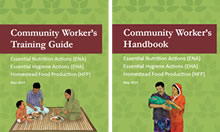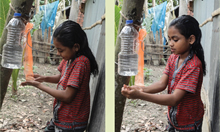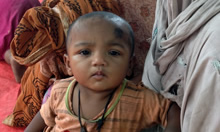
Building on a Strong Foundation
Mst. Nurunnahar, the sub-assistant agriculture officer for the Department of Agricultural Extension in Babuganj upazila, has always been proud of her work, but before 2012, she did not view nutrition or hygiene as part of her responsibilities. Her duties focused on helping to increase and improve food production, but did not include delivering messages about nutrition, food diversity, and hygiene. She had little knowledge about exclusive breastfeeding or complementary feeding for young children and was unaware of their critical importance in the first 1,000 days between pregnancy and a child’s second birthday.
Then, in July 2012, Mst. Nurunnahar attended a two-day training on the Community Worker’s Guide: Essential Nutrition Actions, Essential Hygiene Actions, and Homestead Food Production, an integrated curriculum developed by SPRING/Bangladesh. This module is used to teach nutrition to non-health community workers, like agriculture extension agents and others. After her initial training, Mst. Nurunnahar received yearly refresher trainings to reinforce her new skills.
Inspiring Change throughout the Community
SPRING’s trainings taught Mst. Nurunnahar about the relationship of agriculture to nutrition, and included topics on hygiene, dietary diversity, and gender roles. As an agriculture extension agent, she’s in a position to talk to women about proper hygiene behaviors and how they can use their gardens to improve their family’s nutrition.
After receiving training from SPRING, I can now focus on nutritious and diversified food production. I enjoy motivating pregnant and lactating women for better practices in agriculture, nutrition, and hygiene.
--Mst. Nurunnahar
Mst. Nurunnahar learned about women’s diet and micronutrient needs during pregnancy and lactation. The training included lessons on the importance of proper handwashing to prevent disease that can keep the body from absorbing nutrients, and how to construct inexpensive handwashing stations or tippy taps.

Following the training, Mst. Nurunnahar took the initiative to help families set up tippy taps around households in her community and explained why handwashing is important. By working with the entire household, she ensures that everyone in the family uses good nutrition-sensitive practices. “I enjoy motivating pregnant and lactating women for better practices in agriculture, nutrition, and hygiene,” she explains.
Mst. Nurunnahar now uses her agriculture extension work to link pregnant women to health facilities so they can receive antenatal care checkups and nutrition counseling. Her work helps pregnant and lactating women learn about the need for increased food intake and rest, which can lead to a safer delivery. She advocates for husbands and family members to help achieve these goals so that mothers will have adequate time for self and child care.
Creating Widespread Impact
From 2012 to 2017, SPRING supported nearly 1,000 agriculture extension agents like Mst. Nurunnahar through basic training, refresher training, coordination meetings, and joint supportive supervision with government supervisors.
Partnerships with the Government of Bangladesh help ensure that the greatest possible number of people receive messages about good nutrition-sensitive agriculture practices, and that local structures continue the approach of integrating agriculture extension, nutrition, and hygiene after the SPRING project ends.


